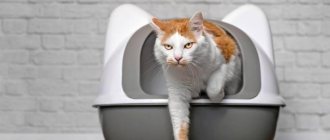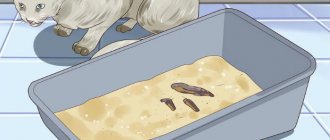(Be the first to vote!)
5589564
06/04/2021 owner reviews
As with humans, it is important to monitor your cat's urine. This is necessary to keep your kitten healthy. So how often should my cat pee? On average, a cat should urinate at least two to four times a day. Cats that drink more tend to pee more often. However, you should beware of excessive urination or lack of urination, which indicates health problems.
- How often should a cat pee per day?
- How often do kittens pee?
- How often do cats pee at night?
- Why doesn't my cat pee enough?
- How long can a cat hold urine?
- Why does a cat take so long to pee?
- What do crystals in cat urine look like?
- Conclusion
How often should a cat pee per day?
Adult cats should pee 2-4 times within 24 hours.
However, factors such as humidity, hydration and overall health will affect how often your cat urinates. For cats with kidney disease, hormonal imbalances, diabetes, and bladder infections, urinary frequency is a sliding scale.
In addition to how often your cat pees, it is important to monitor the color and smell of the urine. Any sudden and severe changes in her indicate a potential health problem that requires veterinary attention.
© shutterstock
What determines the frequency of urination?
The peculiarities of the excretory system of males force them to visit the tray more often than females.
The number increases due to the sex of the animal. An adult cat (over 1 year old) goes to pee 2 times less than a male cat. This occurs due to the structure of the urethra. In males it is thin and curved, so urine is excreted in small portions, but more often. This is especially true for castrated individuals; their canal is narrowed even more.
If the animal is lazy and lies on the sofa all day, then you shouldn’t be surprised that it goes to pee once a day. And when a cat is active and playful, then, like kittens, she drinks a lot of liquid and urinates more often. When eating dry food, your pet will also drink more water, which means it will urinate more often.
How often do kittens pee?
Unlike adult cats, kittens urinate every time they are stimulated. Please note that kittens under three weeks of age need help from their mother to encourage elimination. Mother cats do this by licking their kittens' butts.
After each meal, the kitten needs to be stimulated. He should urinate every time he is stimulated, the frequency of which depends on how often the kitten feeds.
When the kitten is three weeks old, he will be able to regulate his bladder on his own and will urinate up to four times a day.
How much urine should be produced during pregnancy?
Consultation with a hepatologist and gastroenterologist
Go to online consultation:
1).
consultation with a hepatologist-gastroenterologist
;
2). consultation with a gynecologist
;
3). consultation with a urologist
;
4). pediatrician
consultation ;
5). consultation with a dermatologist
;
6). consultation with a narcologist
;
7). consultation with an otolaryngologist
;
8). surgeon
consultation ;
9). consultation with a proctologist
Good afternoon, what color should pregnant women’s urine be? If it is yellow and cloudy, is this normal? I take vitamins Prental Vitrum.
Hello. Yellow urine is normal, but cloudy urine is not so much. When was the last time you had a urine test? What is the gestational age?
Inflammation of the genitourinary system - cystitis, pyelonephritis, urinary diathesis. Pregnant women have a lot of stress on their kidneys, there is no need to take risks, it is better to be safe. And it’s time to register, when do you plan?
My kidneys don’t really hurt, but sometimes my lower back hurts. I go a little often. When I go. does not hurt. But before pregnancy I was diagnosed with chronic cystitis. Which I treated (like orgil) and planned a pregnancy after I drank it. (The doctor said so) I plan to register in 3-4 weeks.
Hello. I’m worried. A month ago, things went well for me twice, the second time it somehow hurt and I was craving something salty or sour, now only the smells irritate me and I felt sick three weeks ago, now the delay is a week, even more. and the urine was cloudy, I wanted to do a test, I bought it, but it wasn’t there, but that’s not the main thing..what can you say?
delay 3rd day, positive test. Urine was cloudy for 2 days, passed a general urine test - reaction ph8, specific weight 1.015. a week ago I took 4 tablets. furadonina-kidney was sick (I didn’t suspect pregnancy yet). Are these bad indicators? Do they indicate poor kidney function?
Source
Why doesn't my cat pee enough?
If your cat only pees once a day or hasn't urinated in 24 hours, you should be concerned. Even a person who does not urinate for so long is a cause for concern. There is a good chance that your pet has urinary problems.
Feline lower urinary tract disease or FLUTD is a common cause of this. FLUTD makes it difficult for cats to urinate due to inflammation of the bladder.
Lower urinary tract disease in cats is caused by a bacterial infection, but mineral imbalances are also a cause. Cats with abnormal urine pH levels are also at high risk of developing this problem.
It can range from mild to severe, which can be worse than your cat developing kidney stones. In some cases, a urethral plug forms and blocks urine from passing through your cat's body.
Cats with this condition often strain while urinating, even if no urine comes out. You should take your kitten to a veterinarian immediately because this condition is life-threatening and can be fatal within hours.
On the other hand, some cats pee too often. This is associated with metabolic problems such as diabetes, as cats with this condition have increased thirst.
Impaired formation of feces
Short-term diarrhea may be caused by changes in feeding composition, stress or overeating. If you have one-time loose stools, you do not need to go to the clinic. But if diarrhea continues for several days, then you should contact a specialist.
Main causes of diarrhea:
A sudden change in diet. New feeds and individual components should be introduced gradually.- Inappropriate feed composition. Sometimes pets, due to the characteristics of their bodies, do not digest certain foods well. The problem can be solved by reviewing and adjusting the diet.
- Poor quality feed.
- Metabolic disease.
- Worm infestation. Toxins and waste products of worms lead to poisoning of the animal’s body.
Diarrhea can also be caused by neoplasms, infections, bacteria, peptic ulcers and other pathologies. To make an accurate diagnosis, you should contact a veterinary clinic. The doctor will conduct an examination and prescribe appropriate tests.
Causes of constipation:
- Excess protein in the diet.
- Dehydration of the body. Usually develops when feeding dry food without free access to water.
- Obstruction or blockage of the intestine. For example, bloat, tumor, hairballs or worms.
- Decreased activity.
- Constant or severe stress.
Before diagnosis, the animal should not be given laxatives. Increased intestinal motility due to blockage can lead to the death of the pet. If constipation persists for 2–3 days, you should consult a veterinarian.
What should be done in case of deviations from the norm?
Prolonged violation of the litter tray requires urgent contact with a veterinarian. First of all, it is necessary to establish the cause, and then carry out treatment.
Most deviations from the norm can be treated by adjusting the diet. But some diseases require urgent intervention and long-term therapy.
How long can a cat hold urine?
A cat can hold in urine for up to 48 hours, but I don't suggest pushing your kitten to the limit. The longer your cat holds her bladder, the higher the risk of developing urinary problems.
Note that urine trapped in the bladder will change its pH level over time. This means your cat is more likely to develop kidney stones, especially if you are forced to constantly hold urine. Please note that cats that are forced to hold their bladder for long periods of time may die.
house-trained siamese cat sitting in cat toilet or kitty litter box
Your cat should have constant access to the litter box. If you're traveling with a kitten, you should take short breaks every six hours to allow your cat to pee.
If you have a planned trip with your cat, you can reduce its water intake a few hours before leaving. This will reduce the frequency of your cat's urination. You can still give small amounts of water along the way to keep the feline hydrated, especially on a hot day.
Conditions of detention
Owners need to know that living conditions play an important role. If the cat is not nervous or stressed, then small and large trips to the toilet correspond to the standards specified in the article . However, even fright can cause diarrhea or constipation. For example, meeting a dog, traveling on public transport, moving to another premises.
In this case, it will be normal if the animal rarely goes to the toilet for a couple of days or does not use the litter box at all. The cat must calm down and understand that there is no danger. Usually no treatment is required, urination and bowel movements return on their own after a couple of days.
Why does a cat take so long to pee?
If your cat takes a long time to pee, it may mean that the cat has drunk a lot of water. However, if the kitten tenses up long before urine comes out, you should have him checked. Your cat may be suffering from urinary problems such as kidney stones, a urinary tract infection, or a blocked urethra. All of these will make it difficult for your cat to urinate.
Additionally, you should watch out for poor bladder control. One tell-tale sign is urine leakage. This often happens when the kitten has to hold his bladder for a long time. The muscles have not yet relaxed, so your cat will take a little longer to pee. If this happens consistently, you should make an appointment with your veterinarian.
Reasons for violations
Sterilization may affect the frequency of the animal's litter box visits.
Deviations from the norm (pets pee less or more) arise due to physiological and pathological factors. Non-dangerous reasons include:
- The presence of severe stress. Perhaps moving, acquiring other animals, fear, climate change, death of the owner).
- The transition to another diet should be gradual. If it is sudden, deviations from the norm occur.
- After castration or sterilization, the frequency of urination changes.
Pathological causes include various diseases: pyelonephritis, glomerulonephritis, cystitis. If your pet’s general condition has worsened (lethargy, drowsiness), body temperature has risen, he urinates frequently or, conversely, rarely, has stopped eating, his stomach has become painful, peeing is also painful, blood has appeared in the urine (hematuria), incontinence, then perhaps These are signs of urolithiasis. This disease often occurs in cats.
When an animal has problems emptying its bladder, this is noticeable by its behavior in the litter box.
If symptoms of the disease appear, the animal must be urgently taken to a veterinarian for examination, testing and prescription of the necessary medications.
What do crystals in cat urine look like?
The crystals in cat urine are microscopic, making them difficult to detect with the naked eye. If you are concerned that your cat has crystals in its kidneys, you should take your pet to the vet. Your veterinarian will perform blood and urine tests to determine the level of crystals in your cat's urine. This test will also provide other results that can help diagnose various health problems.
However, you should keep an eye out for any changes in the color, consistency, or frequency of your cat's urine. If anything is wrong, contact your veterinarian.
Treatment of abnormalities
Urolithiasis can be eliminated with the help of drug therapy and surgery. The veterinarian prescribes medications to improve the general condition and relieve intoxication. Typically, droppers with 5% glucose, 0.9% saline are used for this. solution, vitamins. To treat the disease itself, antibacterial and anti-inflammatory drugs are used, depending on the cause of the disease. Antispasmodics may be prescribed to relieve spasm of the urethra. For severe pain, painkillers and novocaine blockade are used.
If there are large stones that cause discomfort, severe pain and stagnation of urine, surgical intervention is performed. It is done under general anesthesia and is aimed at removing stones that will not pass out on their own due to their considerable size. After eliminating the disease, the veterinarian prescribes a special medicinal food for the cat, which it will eat for life.
Prevention
The incidence of urolithiasis in cats is five times higher than in cats. This disease is one of the most frequently diagnosed after helminthic infestations.
Proper metabolism prevents the formation of stones, so a balanced diet is the key to health, especially when it comes to castrated and sterilized cats. These are truisms, but owners, even when buying premium food, do not comply with the feeding standards indicated on each package, so they mix the finished product with natural food.
Lack of water is one of the reasons for the formation of urate stones, and since cats have a poorly developed sense of thirst, there is a good way to teach your pet to drink more. Place several different vessels with water in different places in the house, this invariably arouses interest in the animals and a desire to try.
Protect your cat from hypothermia. Don't let him sit on a freshly washed floor until it's dry, and don't let him sleep on the floor under an open window. And, of course, watch how often the cat pees. This is the most important marker in home diagnostics of a pet’s health condition.
Diagnostics
As noted above, if a cat pees often, there can be many reasons for this. Therefore, in order not to miss a serious deterioration in the pet’s health and to begin treatment on time, it is necessary to conduct a full diagnosis.
Diagnostics must include:
- Detailed urine analysis.
It looks at the density of urine (kidney function), the amount of protein (inflammation, kidney function), the presence of sugar (diabetes), acidity, sediment, and so on. Each of these indicators can be decisive in making a diagnosis.
- General blood analysis.
It may show the presence of bleeding due to bladder injury, an increase in the number of white blood cells due to infection, etc.
- Blood biochemistry.
It shows blood sugar levels and allows you to evaluate kidney function (creatinine, urea, phosphorus). Elevated liver enzymes may indicate the presence of endocrine diseases.
- Ultrasound of the genitourinary system
. This is the most important diagnostic method that allows you to assess the condition of the bladder, in particular its walls, the presence of stones, salts, and neoplasms. The condition of the kidneys, ureters, and the visible part of the urethra is also necessarily assessed.
But, of course, there are exceptions when drawing up an examination plan. For example, if the pet is young, he has not had any health complaints and there is a suspicion of stress
, in most cases, you can limit yourself to performing an ultrasound of the abdominal cavity.
If bacterial cystitis
, urine must be collected in a sterile manner using cystocentesis (puncture of the abdominal wall) and sent for analysis: bacteriological culture with selection of an antibiotic.
Make an accurate diagnosis of urolithiasis
is possible only by submitting the removed stone for a special analysis to determine its structure.
If you suspect mechanical damage to the bladder
After catheterization, ultrasound may be sufficient. But, to assess the dynamics of recovery, it is necessary to conduct several examinations.
When visualizing a tumor in the bladder
, in addition to a complete examination of the cat to exclude the presence of other neoplasms (in this case, it is best to perform a computed tomography), to take a piece of the tumor for histology analysis, a puncture (biopsy) is required. Only in this case can the nature of the tumor be determined and special treatment prescribed.
If you suspect kidney disease, diabetes mellitus and other hormonal
The disease requires a thorough and comprehensive diagnosis of the pet. Also, in each specific case, the doctor may prescribe additional tests to clarify the diagnosis (for example, blood tests for indicators such as SDMA, cortisol, etc.)
Hurry up, choose a box and find out what gift awaits you
Discount on pet insurance
Promo code copied to clipboard
When should you contact a veterinarian?
Having noticed that the cat has begun to rarely visit the litter box, it is necessary to observe whether other symptoms have appeared. If they are there, you can’t hesitate. Atypical behavior when urinating - a strange posture, meowing - should alert you.
Pathology is indicated by weakness, lethargy and apathy, excessive appetite or refusal to eat, and weight loss. Other reasons to contact a veterinarian:
- indigestion (vomiting, diarrhea or constipation);
- increased or decreased body temperature;
- pallor of the mucous membranes;
- uncharacteristic impurities in the urine (pus, blood);
- strong unpleasant odor of urine.
Some diseases have subtle symptoms, so if the deviation in the number of urination acts persists for more than 3 days, you should show your pet to a doctor. Under no circumstances should you self-medicate; this can aggravate the situation and lead to dangerous complications.











